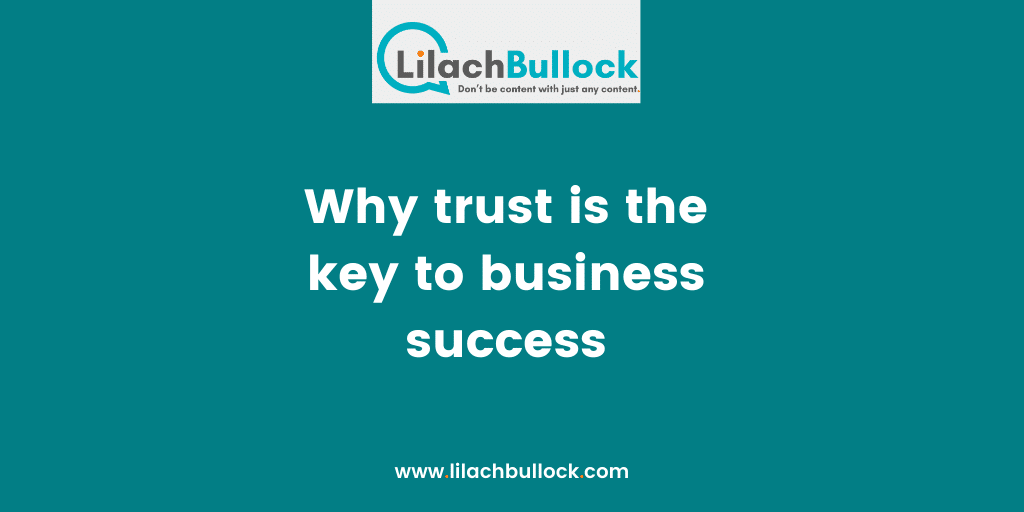Follow Lilach

Why trust is the key to business success
Trust is a powerful asset. It’s the basis for healthy relationships and is crucial in business. Trust is the foundation of any successful business. How come? Businesses are built on relationships. All businesses no matter how big or small rely on relationships. Trust has a huge influence on outcomes and losing trust, whether it be with employees or customers is hugely detrimental.
Why trust is the key to business success
Relationships between leaders, management and employees, staff and customers, and between internal and external stakeholders are vitally important to business. Trust is important to employees and it’s important to customers.
The digital age is exposing poor business culture. The likes of Uber, Sports Direct and more recently Ted Baker, are just a few of the bad apples in the corporate culture orchard. All such scandals cause employees, customers and stakeholders to lose trust. A loss of trust can be catastrophic to the bottom line, and broken trust can be extremely difficult to repair.
What does trust mean?
According to the Oxford Dictionary, trust is defined as:
A ‘Firm belief in the reliability, truth, or ability of someone or something.’
Trust is a part of the human condition. It is a combination of several different attributes, including competency, honesty, reliability, loyalty, accountability, predictability and integrity.
Trust is a key characteristic of effective leadership. Stephen Covey, keynote speaker and advisor on trust, leadership, ethics and performance, speaks eloquently on the subject of trust in business. Author of The Speed of Trust, Covey believes trust is the new currency of our interdependent, collaborative world.
Lack of trust in leadership impacts performance
When employees lack trust in leadership, they disconnect from the core values of the business. Instead of engaging with their job, they spend time watching their backs.
Employee trust is incredibly important in any business. If employees don’t feel connected to leadership, they are much more likely to be disengaged with their work. A lack of trust is disempowering and that has a direct effect on performance.
A recent study at Google, Project Aristotle, looked at understanding why certain teams in the workplace struggle and others thrive. The study concluded that psychological safety was a big part of fostering successful teams. Without trust, teams fall apart. Google’s researchers found that employees need to feel safe to take risks and be vulnerable in front of each other.
When employees don’t feel safe to voice their opinion and can’t let down their guard, their performance suffers. Employee engagement relies on the actions of leaders and it relies on the trust that comes from building a community in the workplace. Leadership expert, Simon Covey says ‘there’s nothing more impactful on people, their work, and their performance, than trust.
Why trust in business matters
New York Times columnist Adam Bryant interviewed 525 CEOs and concluded “if you were to force me to rank the most important qualities of effective leadership, I would put trustworthiness at the top.” He asserts that trust makes people feel safe and more positive (this assertion is backed by Google’s findings from Project Aristotle). These feelings are essential for teams to thrive.
Trust in business matters because it improves employee engagement and increases productivity. It supports employee morale and enables teams to work together more effectively. Trust is also important in the decision-making process. It can reduce the time it takes to discuss key issues and make judgements.
Without trust companies fail.
Creating a consistent and transparent brand, and building a positive company culture is the best way to grow a successful business. Cultivating trust is a big part of that.
How to build trust
Trust starts with the self. Being able to count on yourself and manoeuvre through stressful and difficult times is an essential attribute of a successful leader. All great leaders possess self-trust. The best leaders have the ability to listen to gut instincts and listen to others.
Leaders who understand the power of trust demonstrate this through their actions. They are open and honest and they treat people at all levels with respect. They place trust in their people and allow them to make decisions. Building trust as a leader involves effective communication, openness and transparency. It means speaking the truth and never setting your employees up to fail.
Can you regain trust?
Trust isn’t some elixir that can be bought. It requires effort and discipline. Board director and author Jill Griffin says in article published by Forbes, “Trust doesn’t just happen and it can be very fragile once it is earned.” Griffin says she knows people who have spent their lifetime building a reputation and then lost it in an hour. It is that easy to fall.
Trust can be regained in business, but it has to begin with investing in employees. There’s a widening gap between rich and poor, and many believe lessons haven’t been learned from the financial crash and scandals in business in recent decades. It is up to business leaders to rebuild the trust of their people.
Trust isn’t a soft option. It is highly relevant and critical for business success. It involves leaders letting go of ego and looking out for their employees. Building trust takes effort. It involves valuing people and respecting them. It is what good business culture is made of. Employees respond positively as a result of it and so do customers.

Follow Lilach















